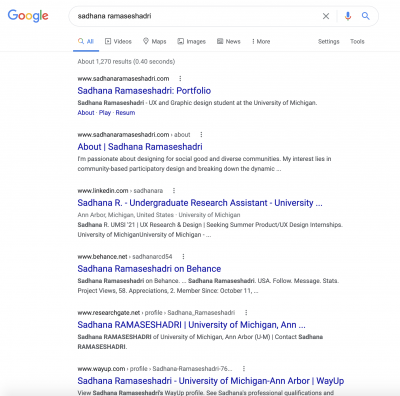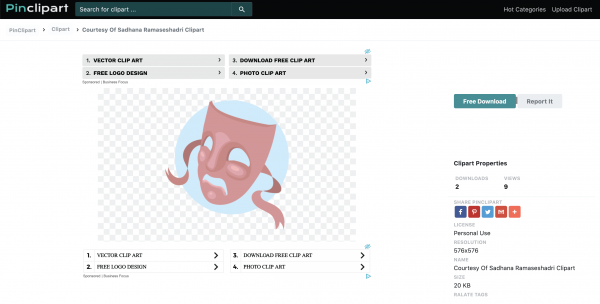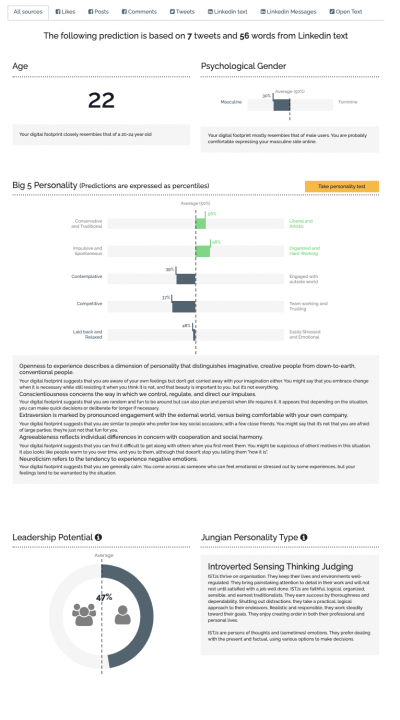Sadhana Ramaseshadri
Contents
Introduction
My name is a central part of my identity. In thinking about my identity on the internet, I have always had a pretty clear picture in my head of what I expect to show up. I am fairly certain that I am one of few, if not the only Sadhana Ramaseshadri. The combination of my first and last name is obviously uncommon in the United States, but is actually quite uncommon in India as well. So, if somebody were to do a quick Google search of my name, I would not expect a whole lot of confusion as to who I am. However, given the fact that since childhood, I have kept my presence on social media and the Internet as quiet as possible. This causes me to wonder about the relationship between how easy it may be to find information about me due to my name, and how difficult I might have made it to access information about me due to personal effort.
My Google Identity
Search Query: 'Sadhana Ramaseshadri'
When I do a Google search of my name “Sadhana Ramaseshadri,” the first three results that come up are from my portfolio website, or from my LinkedIn. Because I doubt that anybody else shares my name, this is something that I expected. During my freshman and sophomore years of college, I was an illustrator for the Michigan Daily, so the majority of the following results point to articles that I have done illustrations for in the past. Additionally, I was able to uncover several accounts to random websites that I may have accidentally created.
After scrolling to the third and fourth page, I found my name credited on a few sites that I was unfamiliar with, such as pinclipart.com and kindpng.com. Upon clicking on these sites, I found some of my illustrations from The Michigan Daily being posted as .PNG files for free download. This was really surprising to me, because the accounts posting my work belonged to people that I had never heard of. Because neither party in this situation is making any money off of my work, and also because I am receiving full credit for it, I question the intent of the accounts that repost them in this way.
As I continued scrolling through the search query of my name, every search result pertained to me, until I reached page 5, where different variations and spellings of parts of my name started to show up, such as “Sadhna” or “Ram Seshadri.”
Search Query: 'Sadhana Ramaseshadri Ann Arbor'
I wanted to check if the number of results would decrease when I increased the specificity of my search query. When I searched 'Sadhana Ramaseshadri Ann Arbor', many of the results were similar to my previous search query, displaying my professional accounts like LinkedIn and ResearchGate. Additionally, my hypothesis was right. This time around, there were only 6 pages of search results, and many showed "Missing: ramaseshadri | Must include: ramaseshadri" . However, in between these results is data from the Michigan Residents database. This includes my public records, address history, voter information, as well as links to similar information about my family members and neighbors. From all the times I Googled my name as a child, I cannot recall my personal information being so publicly displayed. Nor did I find anything when googling my younger brother’s name. Because my brother is not yet of voting age, this led me to infer, as well as confirm through research, that data broker websites draw their information from the Michigan voter database.
Search Query: 'Sadhana Ann Arbor'
Because searching my full name gave such pointed results, I tried to enter in a more ambiguous search. So I searched for “Sadhana Ann Arbor.” Although his brought up a lot more results that I didn’t have relation to.
However, when I scroll down a bit more, the results get a bit unnerving. The fourth result is from the Michigan Residents database. This includes my public records, address history, voter information, as well as links to similar information about my family members and neighbors. From all the times I Googled my name as a child, I cannot recall my personal information being so publicly displayed. Nor did I find anything when googling my younger brother’s name. Because my brother is not yet of voting age, this leads me to infer that websites such as fastpeoplesearch.com draw their information from the Michigan voter database.
My Identity on Social Media
When I googled “Sadhana Ramaseshadri Instagram”, I did not expect my account to pop up at all. Ever since I was young, I have been pretty private on social media, taking steps to private all my accounts and remove my last name from my bios. I also kept from using social media until I was in my early teens, and created my first Facebook account at 13 years old. However, my Instagram account, which does not have any mention of my last name, was the first to pop up. After exploring further, I realized that the account I have linked in my bio, has my portfolio site linked in its bio, which displays my full first and last name.
'Apply Magic Sauce'
Amidst researching my social media presence, I came across a website called Apply Magic Sauce. Apply Magic Sauce is a non-profit academic research project coordinated by the University of Cambridge Psychometrics Centre, which allows users to opt-in to anonymously view how others see them based on their social media data. Because this lab vouches for transparency and ethics from social media sites, I trusted it and input my data.While this website mostly used my social media to come to qualitative conclusions, some of the data that it pulled was almost accurate. It predicted me to be 22 years old, however it also was also not the most accurate, claiming that that "[my] digital footprint mostly resembles that of male users." The site also tried to predict very niche and specific parts about my personality through Tweets, and Linkedin and Facebook posts. While I was analyzing my identity as discovered through Google search queries, I focused on mostly quantitative and tangible pieces of data, but this tool allowed me to view what conclusions that platforms might be able to come to using that information.
= Ethical Implications and Reflection
In Critical Questions for Big Data, Boyd and Crawford say that "In reality, working with Big Data is still subjective, and what it quantifies does not necessarily have a closer claim on objective truth – particularly when considering messages from social media sites." I think this is particularly applicable in the case of my investigation into my social media identity, especially in looking into 'Apply Magic Sauce'. The team that developed this site says that "we feel there should be a greater focus on the psychological traits and emotions that drive behaviour, not merely the fact you have clicked or Liked something," and I agree. While not everything that this site predicted is correct, simply examining clicks without the context of aspects of my personality, or who I chose to portray myself as on Twitter vs on Linkedin, isn't likely to lead to many accurate conclusions.
Although, growing up, I was always super careful about my data identity, I can still so much of myself through a simple google search of only part of my name + my city. This begs the question, how much of our digital footprint do we actually have any control of? Even though I took significant steps as a child to reduce my digital footprint, some of the information closest to me is so readily available on the Internet. Through the Michigan voter database, tons of other websites have access to this information. When citizens are registering to vote, they might be giving up a lot of their personal privacy. Because of this tradeoff between privacy and completing a civic duty, I wonder if the dissemination of information about voters deter U.S. citizens from voting.
All of that being said, I think that despite the sensitive information about myself being so publicly displayed, the efforts that I have taken to control my online presence is quite visible. Most, if not all, of what I found out about myself has to do with my professional life, including my Linkedin, portfolio, and work from previous jobs I've held. Parts of myself that are more tied to my personal life, including my Instagram and Twitter accounts showed up in the very last of the Google search pages. Even the Apply Magic Sauce site could only make limited, and mildly accurate conclusions about who I am as a person. This separation is something that I am thankful for, as it makes me feel like I am in control of who I am, and how I may be seen online by the outside world.
References
Boyd, D., & Crawford, K. (2012). Critical Questions for Big Data: Provocations for a Cultural, Technological, and Scholarly Phenomenon.” Information, Communication & Society, 15(5), 662-679.


